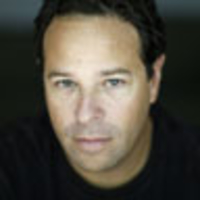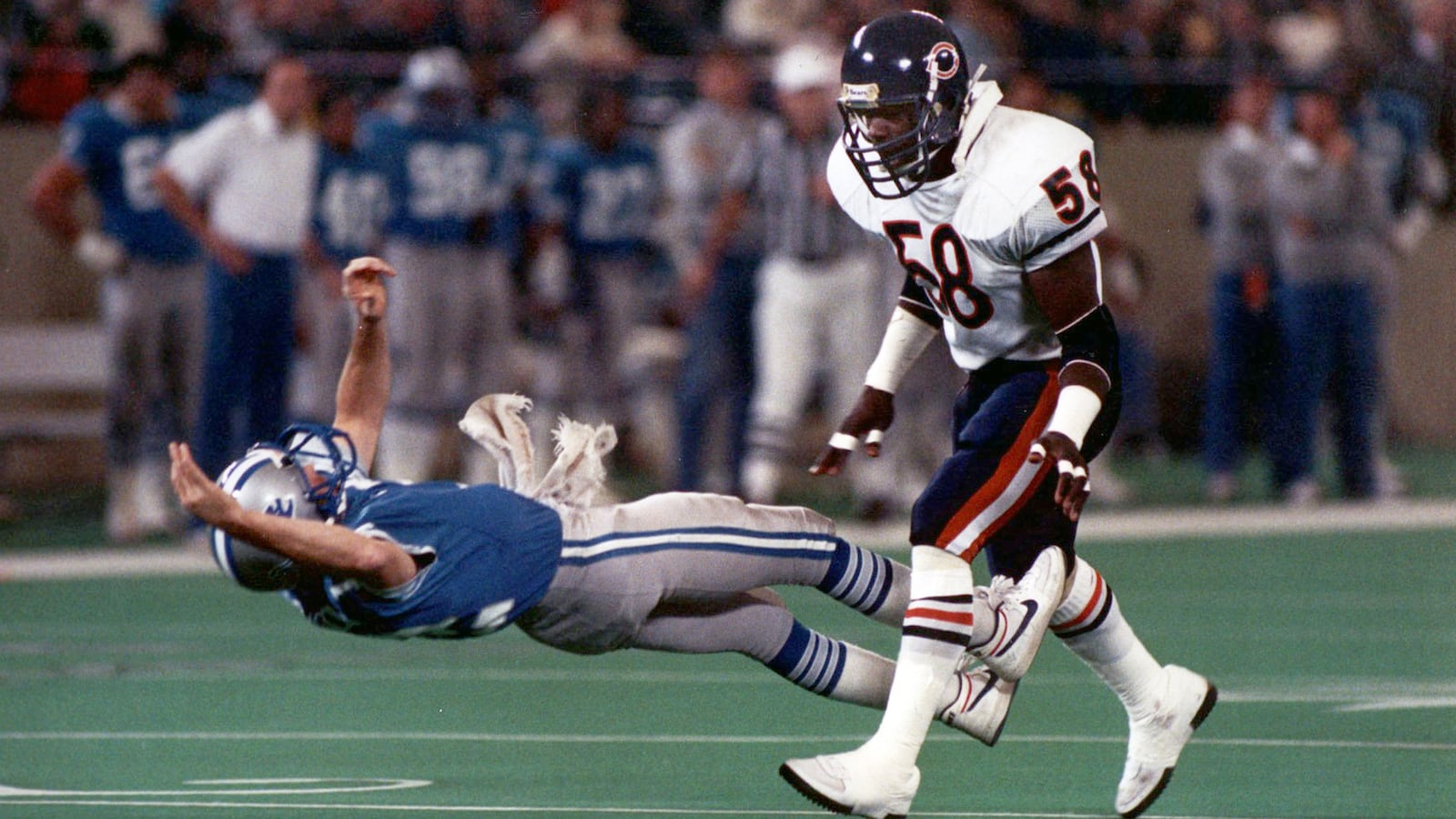Every now and then, a single play captures the spirit of a team. It can stand for an entire season. If you want to learn about the ‘85 Bears, you can talk to old players and old coaches about tactics, or you can simply say, “tell me about the Ferguson Hit.”

The Bears underperformed in the weeks following the Miami game—Chicago’s only loss that season—stumbling through the remainder of their schedule with workmanlike wins over the Colts and the Jets. There was something bleak about this part of the season. It was like the chapter in the book in which the golden boy is set upon by gloom and wonders about the purpose of life. After all, these games had little meaning, the Bears having long since clinched their division as well as home-field advantage in the playoffs. Ditka worried that his players would bring this bad mood into the post-season. The landfill of history is packed with teams that peaked too soon. The Bears needed a shot of adrenaline to wake the barking dogs.
They ended the season at the Silverdome in Detroit. The Detroit Lions were at best mediocre, but their general manager had traded for one of my favorite quarterbacks, Joe Ferguson, who, at 36, was still a creative playmaker and a terrific scrambler. I wanted the Bears to win but expected to see Ferguson complete a few passes. It’s a weakness of mine: I root for the old guys, their old guys as well as my own. What actually happened gave me a sense of what it must have been like for fans whose teams fell into the gears of the 46 Defense.
It was on the second or third play of the game. Ferguson took a snap, dropped back, looked down field, but only for a moment, as the Bears were coming. He scrambled outside, doing his Ferguson thing, stumbled—watching it again, I think, go down!—righted himself, then looked up just long enough to see Wilber Marshall coming full steam, lowering his head, launching. The crown of Marshall’s helmet hit the aging quarterback square on the chin. He went skyward, then dropped. You could see that he was out cold. He landed in the heavy way of an inanimate object. As this was happening to his body, his soul, his spirit, his consciousness, everything that made Joe Ferguson Joe Ferguson, was somewhere else. “I can still see the lick Marshall put on Ferguson,” said Ditka. “My God, I thought he’d killed him.”
The Lions’ coach came out onto the field, followed by a trainer. Someone picked up Ferguson’s arm and let it go. It dropped, lifeless. For the moment, he’d been turned into a cadaver. The back-up quarterback, Eric Hipple, walked onto the field to talk to the coach. He stood there as the staff worked on Ferguson. It was a naturally occurring split-screen: dead Ferguson and concerned coach; concerned coach and fresh quarterback emerging from his can.

A few minutes later, Ferguson, having been revived, sat on the sideline, helmet off, hair tousled, dazed. I’ve seen the same look on the faces of old hobos on the Bowery, methadone addicts on withdrawal, winos with delirium tremens. If El Greco came back, he might want to paint Joe Ferguson five minutes after that hit, his eyes as wide as saucers, a fog all around him, the roof of the Silverdome rising above.
Marshall’s blow did not knock Ferguson out of the NFL. In fact, he stuck around for another four seasons, playing his last game for Indianapolis in 1990. But whenever I spotted him, I would think, “But I saw him die in Detroit!”
While working on this book, I decided to track down Joe Ferguson. It took about twenty seconds to find his number. He sells real estate in Arkansas. I got his machine. I was surprised by his voice. I had watched him play but had never listened to him talk: he had the thickest Southern accent I’ve ever heard; he sounded like a moonshiner from the Ozarks. Who’d buy a house from this guy? I left a message, telling him I wanted to discuss his career with Buffalo and Detroit, his playing style, his college glory, and maybe we could touch on the game against the Bears in 1985. He left a message for me a few days later, saying he’d be happy to talk, but he never returned any of my follow up calls.
Around this time, I met Gary Fencik in Chicago. I told him about my back and forth with Ferguson. He laughed. “What’s so funny?” I asked.
“Well, it’s just that Ferguson’s never going to talk to you about that play. I know, because I tried, too. We happened to be at the same golf tournament. And I said to myself, ‘Hey, Joe Ferguson!’ So I went over, really dying to talk about it, but before I got within ten feet, he puts up his hand and says, “I know what you want to talk about and it will not be discussed. And besides,’ he said, ‘I’m the worst guy to talk to about it. I don’t remember anything that happened the day before or for two days after. It’s completely blank. I recovered, and that’s all.”
For the Bears, the Ferguson Hit was an elixir. It set the tone for the playoffs. It closed the season with a flourish, put an exclamation point on a body of work: four seconds of action that captured the essence of the 46. Especially telling is the fact that Marshall’s play would now get you suspended. (He was fined.) Hitting with the helmet, hitting in the head, hitting a defenseless player, hitting to injure—it’s everything officials are trying to drum out of the league. As Bears Safety Doug Plank said when I spoke to him, “My entire career would be considered a penalty today.”
It’s a matter of special interest to veterans and coaches of the 85 Bears: when your entire style of play is banned, what does it do to your legacy? And what does it mean to fans who loved that team and writers who gloried in it? If you get pleasure from watching the Ferguson hit, what does it say about you?
“What the league has done with the rules is right,” Ditka told me. “You’ve got to protect the player from injury at all costs. Football’s a collision sport. People collide at high speed. And what’s happening, in my opinion, is that the helmet, once meant for protection, has become a weapon. They’re trying to get people to quit leading with their head. There’s a lot of other ways to tackle. Originally, when you were taught to tackle, it wasn’t with your head. The new rules are just trying to get us back to that.”
Other football men were less sympathetic. After discoursing on the glory of big hits, Bill Tobin, who worked for the Bears from 1975 to 1993, eventually becoming the team’s general manager, told me, “and now they’re saying, well, late in life, these injuries are showing up. Hey, if you’re a coal miner, things show up. If you’re a farmer, things show up. The liabilities are there and if you want to take them, go for it. If you don’t, get up in the stands and be a cheerleader or join the band.”
“They’re sissies,” said running back coach Johnny Roland, who was himself a stand-out ball carrier for the Cardinals and the Giants. “They can’t even play football now. They don’t even know how to tackle. They want to protect the quarterback ’cause they’re making so much money and the fans want to see the quarterback. But if you get a good running shot at a guy, hell, that’s why they call it football. They don’t call it tiddly-winks, they call it football.”
Hipple finished the game at quarterback for Detroit. He was sacked again and again but kept getting back on his feet. It was never really close, which made his performance inspiring. In the way of Hemingway’s matadors, he seemed to stand for mankind in its fight against absurdity. Near the end, he was hit in the same way as Ferguson: square on the chin by an airborne Wilber Marshall. The ball was knocked from his hands and recovered by the Fridge, who went 40 yards before being hauled down at the Lions’ 20. It was a prized image in Chicago: the joy of the fat man in the open field. (Ditka: “Fridge is a big man with some fat on; not just a big fat man.”) But what lingers is Hipple, a mile behind the play, struggling back to his feet.
The players were celebrating on the flight home from Detroit, getting loud. Finally, Ditka got on the PA system: All right, Ladies, listen up! There’s nothing to celebrate yet. We have yet to win a single fucking thing that matters. I want you to spend some serious time over Christmas thinking about that and trying to find yourselves. A moment later, as the players stared glumly at each other, McMahon came on the PA: And after you find yourselves, ladies, come find me. I’ll be in a gutter somewhere.





